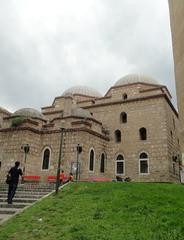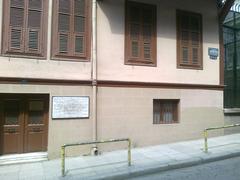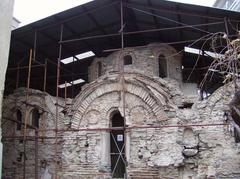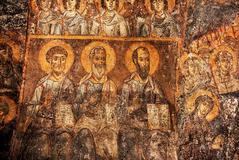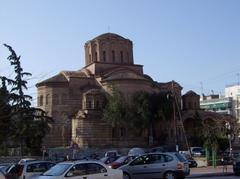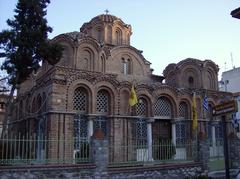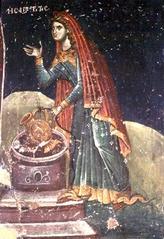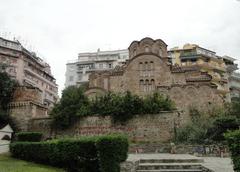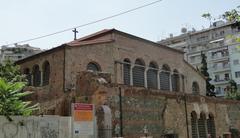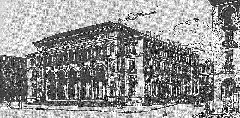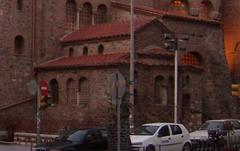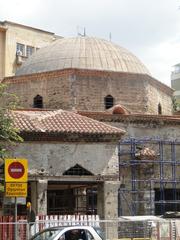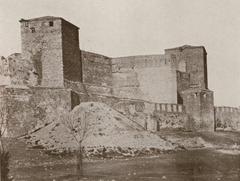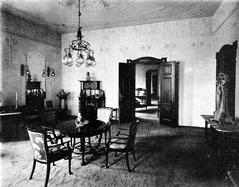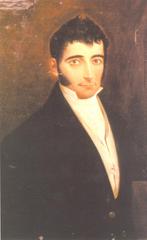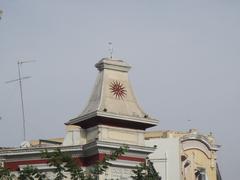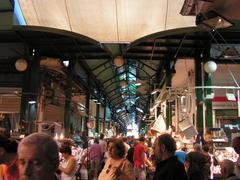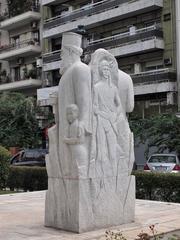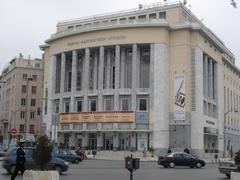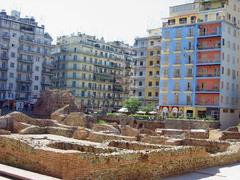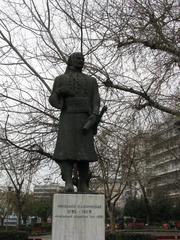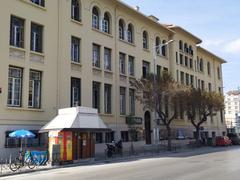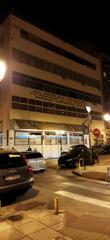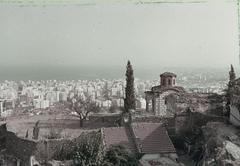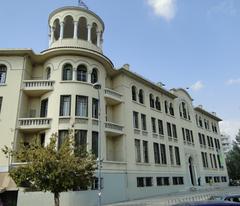
Pasha Hamam Thessaloniki: Visiting Hours, Tickets & Historical Guide
Date: 04/07/2025
Introduction
Pasha Hamam, an architectural and cultural jewel in the heart of Thessaloniki, stands as a profound testament to the city’s Ottoman legacy. Built in the 16th century, this impressive bathhouse offers a unique lens into Thessaloniki’s evolution, bridging centuries of social tradition, urban identity, and architectural innovation. Over time, Pasha Hamam has transformed from a bustling public bath into a preserved cultural venue, reflecting both the resilience of the structure and the enduring significance of Ottoman heritage in northern Greece.
This detailed guide provides comprehensive information for visitors, including current opening hours, ticketing policies, accessibility, and highlights of the hamam’s historical and architectural features. It also offers tips for making the most of your visit and explores the broader cultural relevance of Ottoman bath culture in Thessaloniki. Reliable resources and official tourism websites are included to help you plan your visit and stay up to date with the latest developments (enjoythessaloniki.com, visit-centralmacedonia.gr, inthessaloniki.com).
Historical Overview and Architectural Highlights
Origins and Construction
Pasha Hamam, also known as the Phoenix Baths, was constructed between 1525 and 1530 at the height of Ottoman influence in Thessaloniki (thessaloniki-staedtereise.de). Its strategic location near major city squares and religious landmarks reflects the central role of hamams in urban Ottoman life. The building is a classic example of Ottoman bathhouse architecture, featuring robust masonry, domed roofs, and an internal sequence of rooms designed for ritual cleansing and social interaction.
The bath was originally built as a single bath but was later adapted to accommodate both men and women in separate mirrored facilities—a rare architectural feature in provincial Ottoman cities (visit-centralmacedonia.gr).
Ottoman Bath Culture and Community Significance
Hamams were vital communal spaces in Ottoman society, serving functions that extended beyond hygiene. Ritual purification, spiritual preparation, and social gatherings were integral to the experience, with baths acting as centers for community interaction and female sociability (inthessaloniki.com). The architectural layout—progressing from cold to hot rooms—mirrored the traditional bathing ritual, while domed ceilings and marble elements reflected both aesthetic and practical considerations.
Architectural Features
- Domed Halls: The octagonal dome, inherited from an earlier Christian structure, is a defining feature, punctuated by glass oculi for natural lighting.
- Hypocaust Heating: An advanced underfloor heating system provided warmth and comfort.
- Marble and Stonework: Elegant marble basins, benches, and floors exemplify Ottoman craftsmanship.
- Decorative Elements: Modest plasterwork, geometric motifs, and colored glass create an atmospheric interior, while thick brick-and-stone walls ensure structural integrity (parallaximag.gr).
Historical Continuity and Adaptive Reuse
Operating as a public bath until the late 1960s, Pasha Hamam withstood wars, fires, and urban transformation. In modern times, it has been repurposed as a cultural venue, exhibition space, and event site. Restoration efforts have stabilized the structure and enhanced accessibility, ensuring its continued relevance and preservation (visit-centralmacedonia.gr).
Visiting Information
Opening Hours and Tickets
Visiting hours and access to Pasha Hamam vary depending on its current function and programming:
- Exhibition Space: When functioning as a museum space (e.g., for archaeological exhibits), hours are typically Wednesday–Sunday, 10:00 AM–5:00 PM. Admission is free, with donations welcomed.
- Bar-Restaurant/Event Venue (“Aigli”): In its private venue incarnation, opening hours are:
- Summer (May–September): Daily 19:00–03:00
- Winter (October–April): Friday–Sunday 21:00–05:00
- Special Events: Access may be limited or extended during cultural events, art exhibitions, or concerts. Reservations are recommended for dining or event attendance.
Check official websites or contact the venue in advance for up-to-date information, as scheduling may change due to private functions or public holidays (thessalonikiblog.com).
Location & Accessibility
- Address: 3 Agiou Nikolaou Street, Thessaloniki
- Public Transport: Conveniently located near bus lines and within walking distance from Aristotelous Square and the Roman Agora.
- Parking: Limited street parking; public transport or walking is recommended.
- Accessibility: Restoration has improved accessibility, with ramps and safe pathways, though some uneven surfaces remain. Wheelchair access is partial; contact the venue to discuss accommodations.
Guided Tours
Guided tours are occasionally available, often as part of broader walking tours of Thessaloniki’s Ottoman heritage. Tours provide in-depth architectural and historical context and should be booked through the Thessaloniki Cultural Heritage Office or local tour operators (mygreece.tours).
What to Expect During Your Visit
- Atmosphere: A blend of historic grandeur and contemporary vibrancy, with domed chambers, atmospheric lighting, and a dynamic social scene in the evenings.
- Photography: Photography is generally permitted; ask staff if unsure, especially during events.
- Dining and Events: The modern bar-restaurant offers drinks and light meals in a unique setting. Cultural events are regularly hosted; check local listings and social media for schedules.
- Dress Code: Smart-casual is recommended for evening visits.
Nearby Attractions
- Bey Hamam: Another prominent Ottoman bathhouse in Thessaloniki, open to visitors (inthessaloniki.com).
- Alaca Imaret Mosque & Bezesteni Market: Rich in Ottoman and Byzantine history, both are within walking distance.
- Church of the Holy Apostles & Roman Agora: Explore Thessaloniki’s layered historical landscape.
- Vardaris Square: Offers local markets and authentic cafes.
Practical Tips
- Reservations: Advise in advance for dining or during event periods.
- Language: Staff typically speak Greek and English; menus are bilingual.
- Events: Follow venue social media and local event sites for the latest updates.
Frequently Asked Questions (FAQ)
Q: What are Pasha Hamam’s visiting hours?
A: Hours vary by function—typically 10:00–17:00 for museum exhibitions and 19:00–03:00 or 21:00–05:00 for the bar-restaurant. Confirm before visiting.
Q: Is there an admission fee or ticket required?
A: Admission is free for exhibitions and as a bar-restaurant; reservations may be needed for events.
Q: Is Pasha Hamam wheelchair accessible?
A: Accessibility has improved but is not full; contact the venue for specific needs.
Q: Are guided tours available?
A: Yes, occasionally, especially as part of larger heritage tours—book in advance.
Q: Can I attend cultural events at Pasha Hamam?
A: Yes, check local listings and the venue’s social media for current programs.
Preservation, Educational Value, and Cultural Relevance
Restoration efforts have ensured that Pasha Hamam remains a vital link to Thessaloniki’s Ottoman past. Educational displays, guided tours, and cultural programming foster awareness of the site’s historical significance and the broader context of hamam culture in the city (inthessaloniki.com). Its adaptive reuse as a cultural venue bridges the past and present, maintaining the hamam as both a historical monument and a dynamic part of Thessaloniki’s urban life.
Enhance Your Visit
- Combine with Other Sites: Explore nearby Ottoman and Byzantine landmarks for a comprehensive cultural experience.
- Download the Audiala App: Access guides, book tickets, and receive updates on events.
- Stay Updated: Follow official tourism and venue channels for the latest opening hours, exhibitions, and special events.
Suggested Visuals:
- Exterior and interior photos of Pasha Hamam’s domes and chambers.
- Map pinpointing Pasha Hamam’s location.
- Virtual tours available through official tourism platforms.
Summary & Final Tips
Pasha Hamam is an enduring emblem of Thessaloniki’s rich multicultural legacy. Its layered history—from Ottoman bathhouse to modern cultural venue—offers visitors a tangible connection to the city’s dynamic past. Whether you are exploring its stunning architecture, attending a special event, or simply enjoying the ambiance, Pasha Hamam is a must-visit site for anyone interested in history, culture, and the living heritage of Thessaloniki.
For the best experience, confirm opening hours in advance, consider joining a guided tour, and explore related sites nearby. Embrace the opportunity to connect with centuries of tradition while engaging with Thessaloniki’s vibrant present.
Official Resources & Further Reading
- Enjoy Thessaloniki – Muslim Buildings: Pasha Hamam
- Visit Central Macedonia – Pasha Hamam (Phoenix Baths)
- In Thessaloniki – Bey Hamam
- Thessaloniki Blog – Opening Hours and Tickets
- Parallaxi Magazine – Ta Loutra Foinix (Pasha Chamam)
- My Greece Tours – Ottoman Era Private Walking Tour

